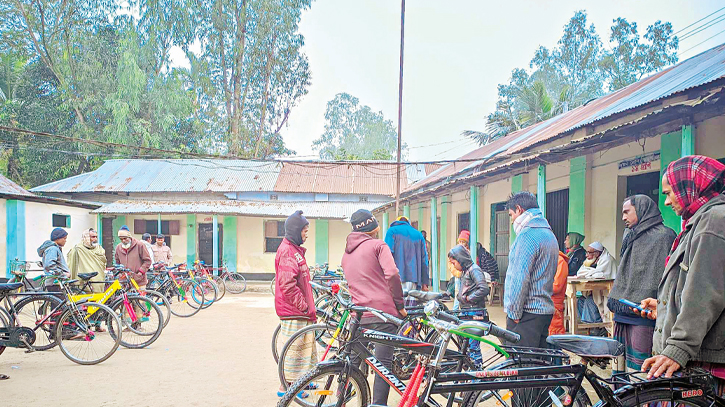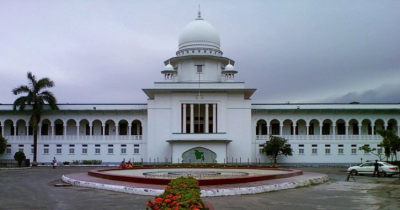
Buyers and sellers congregate at the used bicycle market held twice a week in Gaibandha Sadar Upazila to purchase bicycles at affordable rates. Photo: Messenger
Bicycle enthusiasts are finding solace in Gaibandha's old bicycle market in the face of escalating fuel prices causing distress among low to middle-income individuals.
The surge in fuel cost has prompted many to reconsider their commuting options, leading to a noticeable shift towards the economical and environmentally friendly alternative – bicycles.
The market, located in Gaibandha Sadar Upazila along the Gaibandha-Palashbari Regional Highway, specifically in Tulshighat, Sahapara Union, has become a hub for both buyers and sellers of old bicycles.
Once a mode of transportation that revolutionized communication, the century-old bicycle continues to hold its value in the modern era. Considered a safe means of travel for individuals of all ages, from children to the elderly, bicycles have become a practical choice for short-distance travel.
The scene is marked by a flurry of activity as transactions take place and individuals negotiate deals. The market operates twice a week, on Mondays and Thursdays, drawing in crowds eager to explore the array of bicycles on display.
Upon visiting the market, one can observe around 30 to 40 bicycle sellers showcasing their wares. These sellers acquire old bicycles from various markets in Gaibandha and bring them to Tulshighat for resale. Prices range from 3,000 to 8,000 taka, with lessees requiring a minimal fee of Tk 200 for a bicycle purchase. The market caters not only to regular traders but also to individuals compelled by necessity to sell their bicycles.
Matiur Rahman, a seasoned bicycle seller from Ramchandrapur Union, shares his experience of 25 years in the business at Tulshighat and Dariyapur haat. He notes a significant uptick in sales, attributing the surge to the escalating fuel prices that prompt people to opt for bicycles over motorcycles for short-distance travel.
Azizul Haque, a customer in the market, speaks of buying an old bicycle priced between Tk 4,000 and 5,000 for his son. The rising need for economical transportation has prompted individuals like him to explore cost-effective options in the form of old bicycles.
Conversely, individuals like Momin Mia find themselves in a dilemma when selling their used bicycles. Momin expresses a desire to sell his bicycle for Tk 4,500, but the market reality dictates offers around Tk 2,500. This stark difference in expectations showcases the economic challenges faced by both buyers and sellers in the current market conditions.
Touhidul Islam, a private company employee, emphasizes the economic strain of daily commuting expenses and contemplates purchasing an old bicycle from Tulshighat market. The market's lessee, Moshiur Rahman, notes a substantial increase in sales from 5 to 7 bicycles per market to 15 to 20 bicycles, attributing the surge to the overall inflation in market prices and the growing preference for bicycles over motorcycles due to rising fuel costs.
Gaibandha's old bicycle market has become a beacon of hope for those seeking sustainable and cost-effective transportation alternatives amid economic challenges. The market's popularity reflects a growing trend of individuals embracing the simplicity and efficiency of bicycles, showcasing the enduring appeal of this century-old mode of transport.
The old bicycle market in Gaibandha is not just a marketplace but a reflection of a shifting paradigm in transportation choices driven by economic considerations. As the market witnesses a surge in both sellers and buyers, it underscores the resilience of bicycles in providing an accessible and eco-friendly means of commuting.
This grassroots movement towards sustainable transportation solutions not only addresses the financial constraints faced by many but also aligns with a broader global awareness of the need for environmentally friendly modes of travel. The continued success of Gaibandha's old bicycle market signals a community-driven commitment to practical, affordable, and eco-conscious mobility solutions in the face of economic challenges.
Messenger/Fardin








